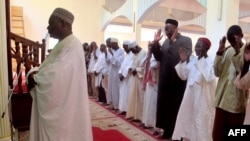Muslims in Cameroon have defied and are protesting government restrictions on prayer attendance at mosques, imposed to reduce the spread of COVID-19, which has so far been confirmed in 92 people in less than a month.
The Muslims say the government order defies God’s teachings. Hundreds of Muslim faithful attended their Friday worship sessions in mosques throughout Cameroon despite the government order for prayers to be said at home and for numbers in worship houses to be limited.
As a sign of protest, they sat in front of mosques for 20 minutes.
The government said most of those defying the order were on the central African state’s northern border with Nigeria. Student Koulanya Abo, 23, said he went to the mosque in the town of Maroua in the Far North region of Cameroon to pray for Allah to rid the world of the disease.
"This is a time people have to go to the mosque and pray ceaselessly. Anything out of that will not be tolerated by Allah, because this is a period where people are facing a lot of difficulties due to the outbreak of the pandemic COVID-19," Abo said.
Terrorist area
Cameroon’s Far North region has been an epicenter of Boko Haram terrorist attacks for 10 years. The Nigerian Islamist militants want to create an Islamist caliphate. They have not made a statement on their stand on COVID-19.
However, Bouba Bakary, the traditional leader and Muslim spiritual guide of Maroua, said that when he noticed resistance to the government order, he directed clerics under him to keep an eye on extremists.
He said he told the 1,200 imams and clerics under his authority that the measures taken by the government were aimed at saving their lives and protecting their communities from a deadly disease that has killed thousands of people all over the world. He said there was a surprising amount of resistance, and he wanted the government to take further measures that would force the faithful to obey the instructions and at the same time maintain peace.
Bakary said he was also asking the government to use such local languages as Fulfulde and Haoussa to inform both clerics and the faithful who may not understand French that COVID-19 kills, and that the decision that people should stop crowding into mosques was made to save their lives.
Cameroonian Minister of Youth Affairs and Civic Education Monouna Foutsou said the situation was very worrying. He has sent youths not only to the regions where there is resistance but all over Cameroon to inform civilians that they should abide by the measures or they will be punished.
Youths sent to spread word
He said President Paul Biya had instructed him to advise Cameroonians to be socially responsible, and he has dispatched youths to towns and villages with loudspeakers, flyers and banners to try to persuade the population to adhere to the lifesaving measures directed by the government. He said the government would not spare anyone who exhibited irresponsibility after the two-day education phase.
A crisis meeting was held at the Defense Ministry on Friday, where it was decided that the military would be deployed to areas where there is resistance.
The first case of COVID-19 was confirmed in Cameroon on February 6. Health officials said Saturday that the number of confirmed cases had increased to 92. Two people have died.
In an effort to stop the spread of the virus, Cameroon on March 18 closed its borders and suspended issuance of visas into the country until further notice. The central African state also closed all schools and asked Christians and Muslims to limit worship attendance and pray at home.




